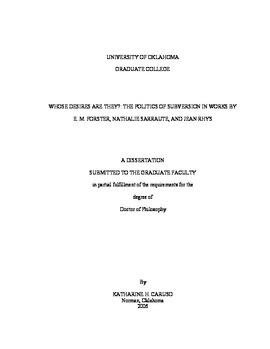| dc.contributor.advisor | Davis-Undiano, Robert-Con, | en_US |
| dc.contributor.author | Caruso, Katharine H. | en_US |
| dc.date.accessioned | 2013-08-16T12:20:25Z | |
| dc.date.available | 2013-08-16T12:20:25Z | |
| dc.date.issued | 2006 | en_US |
| dc.identifier.uri | https://hdl.handle.net/11244/1110 | |
| dc.description.abstract | This dissertation examines the ways in which we read representations of the feminine subject in works that have been deemed complicit in strengthening hierarchies of gender and/or race. Building upon feminist critics' theories of the feminine subject and the New Woman, I investigate debates surrounding A Passage to India, Tropismes, and Wide Sargasso Sea while analyzing such works' complex representations of "woman" (and what "woman" should be). In the first chapter, I examine critics' perceptions of E. M. Forster's politics and question the validity of reading Adela Quested as mere scapegoat. I emphasize the important role Adela Quested plays in both disrupting and maintaining colonial power in Forster's imaginary Chandrapore. The second chapter examines how Sarraute's rejection of traditional characterization coupled with her claim to be an "androgynous" writer have made reading Tropismes problematic for many feminist scholars. Through close readings of passages in Tropismes which specifically challenge received ideas of "woman, " I argue that Sarraute effectively works to defamiliarize myths about what women "want" and that she also explores how living up to such myths is made desirable. I begin the last chapter by questioning critics' conflation of Jean Rhys with Antoinette and the resultant conclusion that Rhys's work is at best apolitical and at worst thoroughly racist. I contend that this conclusion is reductive and does not take into account Rhys's complex, if conflicted, understanding of her own identity. An examination of these works' critical reception histories and of their complex representations of the feminine subject reinforces what is at stake for feminist inquiry should we accept the "authority of experience" as the origins of inquiry. I ultimately argue that these authors resist facile equations of their works with their personal experiences and distance themselves from their protagonists in order to productively challenge stereotypical notions of what "woman" should be. | en_US |
| dc.format.extent | iv, 159 leaves ; | en_US |
| dc.subject | Rhys, Jean Criticism and interpretation. | en_US |
| dc.subject | Literature, Modern. | en_US |
| dc.subject | Forster, E. M. (Edward Morgan), 1879-1970 Criticism and interpretation. | en_US |
| dc.subject | Literature, English. | en_US |
| dc.subject | Women in literature. | en_US |
| dc.subject | Literature, Caribbean. | en_US |
| dc.subject | Literature, Romance. | en_US |
| dc.subject | Politics and literature. | en_US |
| dc.subject | Feminism in literature. | en_US |
| dc.subject | Sarraute, Nathalie Criticism and interpretation. | en_US |
| dc.title | Whose desires are they? The politics of subversion in works by E. M. Forster, Nathalie Sarraute, and Jean Rhys. | en_US |
| dc.type | Thesis | en_US |
| dc.thesis.degree | Ph.D. | en_US |
| dc.thesis.degreeDiscipline | Department of English | en_US |
| dc.note | Adviser: Robert-Con Davis-Undiano. | en_US |
| dc.note | Source: Dissertation Abstracts International, Volume: 67-10, Section: A, page: 3814. | en_US |
| ou.identifier | (UMI)AAI3238359 | en_US |
| ou.group | College of Arts and Sciences::Department of English | |
